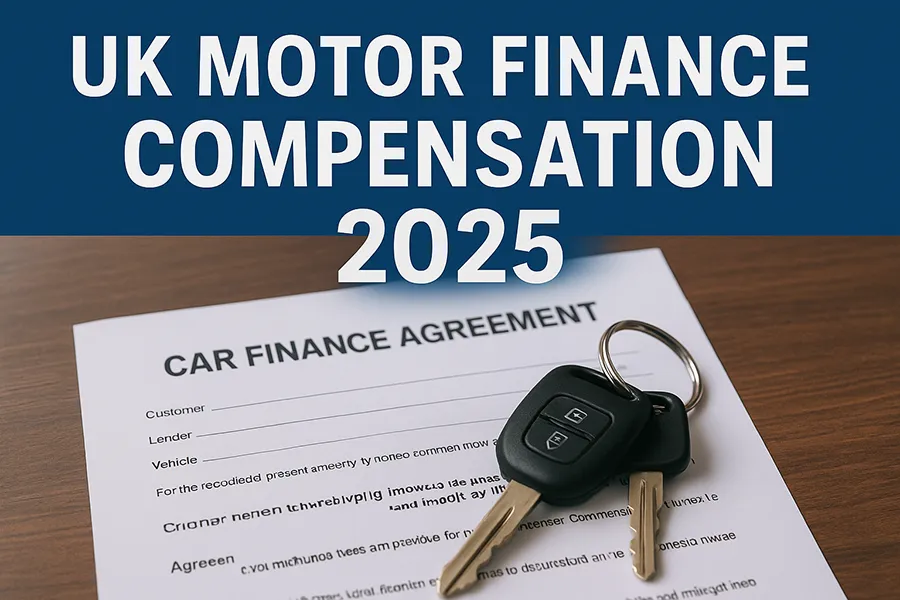Overview
Millions of UK drivers may be due compensation after a major ruling on mis-sold motor finance agreements.
Between 2007 and 2024, many car buyers were charged higher interest rates because dealers or brokers secretly earned extra commission from lenders — a practice now banned.
The Financial Conduct Authority (FCA) is consulting on a £9–18 billion compensation scheme, potentially affecting up to 14 million finance agreements.
If you bought a car, van, or motorbike on finance during that time, you could be owed money.

What is the motor finance scandal about?
- Many lenders allowed dealers to set customer interest rates and earn more commission by increasing them.
- These “discretionary commission arrangements (DCAs)” were not always disclosed to customers.
- This created a conflict of interest, since the dealer could profit by charging you more.
- The FCA banned DCAs in 2021, but many people had already been affected.
What has changed recently?
- August 2025: The UK Supreme Court ruled that failing to disclose commission could make past agreements unfair or unlawful.
- October 2025: The FCA launched a public consultation on a nationwide redress scheme to refund affected consumers.
- The regulator expects most individual payouts to be under £950, but some may receive more depending on interest overcharges.
Official source: FCA consultation statement →
How much compensation could I get?
- Average payout: around £700 – £950 per finance agreement (FCA estimate).
- Total industry cost: roughly £11 billion (including admin).
- Actual amount depends on:
- Your loan’s interest rate
- Whether a discretionary commission was added
- How much you repaid
- Evidence or records available
Who is eligible to claim?
You might qualify if:
- You took out a car, van, or motorbike finance agreement between 2007 – 2024.
- The finance was arranged through a dealership or broker (not directly with a bank).
- The lender or dealer did not clearly explain the commission or how it affected your rate.
- You paid interest that was higher because of that undisclosed commission.
If your agreement was after January 2021, it’s unlikely to involve a banned commission, as DCAs were outlawed by then.
What should I do now?
1. Gather your documents
Find your car finance paperwork, emails, or lender statements. Note:
- Dealer name
- Lender name (e.g. Black Horse, Santander, Barclays, Close Brothers)
- Agreement dates and loan details
2. Don’t rush to claims firms
The FCA says you do not need a claims management company (CMC) or law firm to apply.
These companies often charge 25–30% of your compensation.
You can apply directly once the official scheme opens.
3. Check reliable resources
Be careful of scams
Scammers are already targeting motorists.
Watch out for:
- Texts or calls claiming you’re “guaranteed £3,000 payout”
- Requests for up-front fees
- Fake FCA or bank logos
- Social-media “quick claim” links
Always go through your lender or the official FCA website.
FAQs
Q: I’ve already complained — will I need to apply again?
A: No. The FCA says previous complaints will be included automatically in the redress review.
Q: I don’t have my contract — can I still claim?
A: Yes, lenders must hold records. Even if data was deleted, the FCA expects them to take responsibility.
Q: Will this affect my credit score?
A: No. Submitting a redress claim does not affect your credit file.
Q: When will I get my money?
A: The FCA aims to finalise the scheme in 2026. Payments would follow once lenders have systems in place.
Q: Is this like PPI?
A: Yes — it’s being called the biggest compensation programme since PPI, though most payouts are smaller.
Key Takeaway
If you bought a car on finance in the past 15 years, you could be owed hundreds of pounds.
Stay informed, keep your records safe, and wait for the official FCA compensation scheme — not private claims ads.
